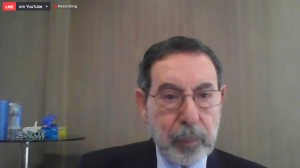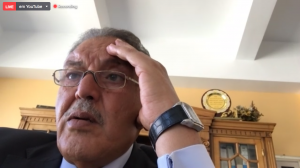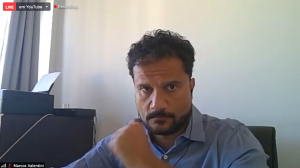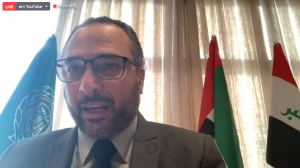São Paulo – The impact of Covid-19 on shipping logistics between Brazil and the Arab countries has been less severe than expected, Union of Arab chambers secretary-general Khaled Hanafy said. He was featured in a webinar on the effects of Covid-19 on Brazilian-Arab logistics, hosted by the Arab Brazilian Chamber of Commerce (ABCC) and by the Union this Wednesday morning (12). The event got viewed by some 900 people in Brazil and the world over. .

“We were expecting worse, and that is a a good thing. We also learned that there’s a lot of potential in a connection between the Arab countries and Brazil and other Latin American countries, because the situation is less than ideal right now when it comes to shipping and logistics. This could be taken to mean something negative, but on the other hand it means that there’s a lot of room for growth and improvement,” he said.
Senator and Senator and Brazil-Arab Countries Parliamentary Group chairman Jean Paul Prates (pictured above) said logistics in Brazil are working as usual, in line with health safety and logistics protocols in place in each state and from the Brazilian Ministry of Health. “Logistics are unchanged in Brazil despite the pandemic. It is important to note that it hasn’t stopped,” he said.

According to Hanafy, work can be done along three pillars to improve logistics and trade. “The first one is direct maritime shipping routes, the second is logistics solutions, and the third pillar is trade in commodities that might solve a few issues. Once again, the idea is not to capitalize on simple international trade, the idea is to have a strategic partnership,” he said.
ABCC secretary-general Tamer Mansour moderated the event. “We definitely must work alongside Brazil’s government and private sector, because there are great opportunities in place for implementing these ideas,” he said.
Prates said a direct shipping route is important for business. “Creating shipping lanes isn’t that simple. It requires analysis and a guarantee of scale beforehand. No one is about to create a route where there is no market. And then you have the streamlining of paperwork, efficiency, and most of all the will and the interest on the part of ports in Brazil,” he said.

ABCC International Relations vice president Osmar Chohfi argued that logistics is of the utmost importance to Brazilian-Arab trade. “Some 6% of Brazil’s foreign trade is done with the Arab world. We have conducted internal studies to look into the possibility of getting exports from Brazil to the Arab countries from USD 11 billion to USD 20 billion in the next four years. Bilateral trade could be as high as USD 30 billion a year in a not-so-distant future,” he said. To that end, Chohfi claims that efforts must be stepped up in marketing and promotion. Other requirements include a favorable institutional framework, investment in production, and in-depth studies in logistics.

League of Arab States assistant secretary-general Kamal Hassan Ali said global transportation and logistics have been severely affected by the pandemic, since industries are focusing on storage, transportation, purchase and the flow of goods as a key part of global value chains. “Let us work to enhance mutual investment across the board in order to achieve the planned goals of Brazil and the Arab world,” he said.
Alexandria Chamber of Commerce in Egypt president Ahmed El Wakil stated that the pandemic made investing in logistics a priority. “As the pandemic threatens the world economy and as production chains slow down, we intend to work on preventing the worst. We cannot depend on one source only, so we decided to diversify production chains, to make sure that these chains will survive through support to local industry. We will support work to overcome this crisis. Thus being, investing in logistics has become even more of a priority than it was before,” he said.

Logistics and supply chain specialist, data scientist and SCL Big Data Analytics founding partner Marcos Valentini discussed the enhancement of strategic partnerships through food safety chain digitization, indexed commodity input prices, purchase consolidation and logistics.
Production for the Arabs
Senator Prates said Brazil needs to address two major challenges, pandemic or otherwise: adding scale and quality to production intended for Arab countries.
Prates recalled that while on a presidential tour of the Arab countries alongside president Luiz Inácio Lula da Silva, in 2003, he brought along projects for the export of fruit, sheep, and dimension stones. “As a case in point, I would say that our fruit farming is at a very mature stage right now. However, sales to the Middle East are still incipient. For example, the UAE buy USD 2.2 billion worth of fruit from the world, and Brazil supplies only USD 17 million, which is less than 1% of their fruit imports, even though we are net exporters of fruit,” he said.

Sheep farming, according to the senator, lacks standardization, perennialization and customization into halal standards, but a vast potential is available through investment in production. “Dimension stones are required to ship to Arab countries through Europe, due to processing and industrialization issues. They could ship direct instead,” he said.
Besides scale, production quality and financing conditions. Prates mentioned the issue of middlemen in Brazilian-Arab trade. “The bulk of our output is forced to go through european ports due to reasons of scale, logistics and commerce. Melons, for instance, must go through Rotterdam. There are no direct routes,” he said.
Speakers also included Yahia Zaki, chairman of the Suez Canal Economic Zone; Fábio Lavor, New Concessions and Port Regulation Policies director at Brazil’s Secretariat for Ports; Tessa Major, Central and South America vice president at the International Association of Ports and Harbors (IAPH) and Port of Açu International Business and Innovation director; and Sarah Elgazzar, dean, College of International Transport and Logistics of the Arab Academy for the Science Technology & Maritime Transport (AASTMT) and Union of Arab Chambers economic advisor.
Unimar Projects and New Business manager Pedro Oliveira and Gulf Freight Group CEO Moataz Mosleh, both of whom are ABCC members, asked questions towards the end of the webinar.
For more on the webinar please check out:
Throughput at Brazil’s ports up 4% amid pandemic
You can watch the full webinar here:
Translated by Gabriel Pomerancblum




